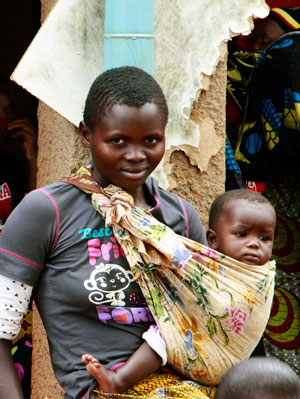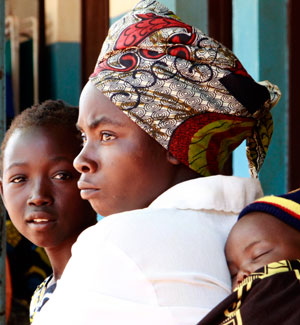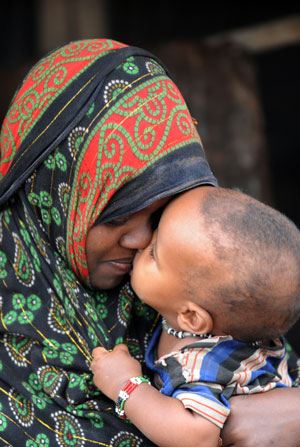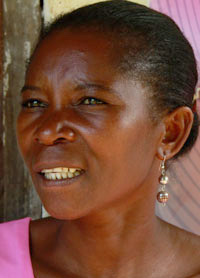- Highlights
- Overview
- Key figures
- Promoting community involvement in maternal and child health
- Reaching vulnerable communities with vital health services
- Strengthening government health systems
- Fostering positive social and behavioural change
- Empowering women to identify and demand their rights
- Challenges
Case studies:
- Community Health Worker Assessment and Improvement Matrix (CHWAIM)
- The Story of Evelyn, the village chief in Mpindimbi, Tanzania
Highlights
Fatima, a young Tanzania woman visits the Marie Stopes Tanzania outreach team to receive advice on family planning. Photo: Martin Potter/MSIA
Ethiopia
Anglican Overseas Aid supported the formation of inclusive Community Development Committees. These committees enabled some communities to incorporate women who were previously excluded in discussions and decision making on issues around health for the first time.
Tanzania
It is estimated that Marie Stopes International outreach activities will prevent more than 27,720 unplanned pregnancies and prevent 3,945 unsafe abortions over the lifetime of the clients receiving services.
Kenya
It is estimated that Marie Stopes International outreach activities will prevent 20,540 unintended pregnancies and prevent 2,800 unsafe abortions over the lifetime of the clients receiving services. After sharing the results of the community-based verbal autopsy reports that Community Health Volunteers (CHVs) were trained to undertake, the neonatal stage was identified as the stage where most child deaths occur and therefore a critical period for interventions. As a result, CHVs are being supported to undertake three visits to women after delivery as a way to prevent neonatal mortality.
Uganda
World Vision identified Community Health Volunteers (CHVs) motivation as a challenge but a key issue for the sustainability of community level health systems. World Vision Uganda is drawing on the experience in World Vision Rwanda of linking incentives to performance. This has resulted in the establishment of a technical working group by the National Village Health Teams Coordination Committee and the development of motivation strategies for CHVs. By building the capacity of CHVs, they have more skills, are more motivated and effective and as a result are more likely to be retained.
Plan International assisted a coalition led by the Centre for Domestic Violence Prevention to develop guidelines on the procedural and enforcement mechanisms of the Domestic Violence Act which was passed in 2010. The guidelines were needed to implement the Act and respond to the large number of women and girls experiencing domestic violence.
Zimbabwe
During the year, Plan International, Musasa and St Peter's Community Care worked with community leaders and volunteers to conduct 68 rights awareness sessions. These took the form of dramas and presentations on human rights, and sessions on the Domestic Violence Act, the Inheritance Act, the Marriage Act, the legal age of majority and child rights.
Overview
Globally, there were an estimated 287,000 maternal deaths in 2010, with 56 per cent occurring in Sub-Saharan Africa.5 The highest rates of child mortality in the world are also found in Sub-Saharan Africa where one in nine children dies before the age of five.6 The majority of these deaths could be prevented if women have better access to services to prevent or treat complications associated with pregnancy and birth. It is highly unlikely that countries where AACES is working will meet both MDG 4 and 5 in child and maternal health by 2015.7 AACES programs aim to improve maternal and child health in Ethiopia, Kenya, Mozambique, Rwanda, Tanzania, Uganda and Zimbabwe through addressing challenges such as weak health systems at facility and community levels, poor transportation and lack of access to health facilities, for all of which the situation is worse for women living in rural and remote areas. The high cost of health services, lack of skilled birth attendants and cultural beliefs and attitudes often prevent women from accessing and using health services.
Key figures
At the Chitwali clinic in Tanzania, a young woman waits for a contraceptive implant during a visit by the Marie Stopes Tanzania outreach team. Photo: Martin Potter/MSIA
AACES maternal and child health programs reached over 51,000 people in 2011–12:
- more than 30,000 people accessed a modern family planning method
- more than 20,000 children received life-saving vaccines
- more than 1,700 babies were delivered through clean and safe practices.
In the first year of the program, the Australian Foundation for the Peoples of Asia and the Pacific Ltd (AFAP), Anglican Overseas Aid, World Vision, Plan International and Marie Stopes International successfully increased access to and improved the quality of health care for women and children living in marginalised communities. In order to achieve better access to maternal and ante-natal health services by the poor and vulnerable, program partners successfully worked with government, community structures and various other stakeholders.
Key areas of support included:
- promoting community involvement in maternal and child health
- reaching vulnerable communities with vital health services
- strengthening government health systems
- fostering positive social and behavioural change
- empowering women to identify and demand their rights
In 2011–12, AACES partners succeeded in addressing some important issues that were causing inequity and exclusion in accessing health services. Emphasis was placed on building positive change for the most marginalised people through behaviour change activities and by ensuring community engagement, strengthening of health systems and delivering of services at health facilities and community levels.
Promoting community involvement in maternal and child health
In 2011–12, program partners worked with communities to identify community needs, ensured the relevance of program activities, mobilised communities to use health services and built support for the program.
Community engagement programs started with meetings to help raise the awareness of women and community leaders where there was a need for improved maternal and child health. The meetings highlighted the centrality of communities in improving maternal health care through removing barriers that often prevent women from using health services such as family planning. Program partners acknowledged the need for continued engagement with community leaders such as chiefs and religious leaders in order to achieve program objectives related to social change.
The AACES program also established and strengthened existing community structures that enable women to access health services and foster their inclusion in development agendas. In achieving this objective, Anglican Overseas Aid established Community Development Committees (CDCs) among nomadic communities of the Maasai in Kenya and the Afar in Ethiopia. In Ethiopia, Anglican Overseas Aid's partner, the Afar Pastoralist Development Association (APDA) formed CDCs in all 49 project sites, ensuring increased community participation and greater decision-making involvement for women. Importantly, CDCs liaised with local authorities on community priorities such as improving access to health and other services. In Kenya, Anglican Overseas Aid, through its partner the Mothers Union of the Anglican Church (MUAC), successfully signed an agreement to implement a 40 per cent quota of women and other marginalised groups in the composition of CDCs. This will ensure that the interests of women and children are better represented and communities are more informed to develop plans that prioritise the health of women and children.
Reaching vulnerable communities with vital health services
Guluma Nadamo, Mulunesh Noaora are using family planning in order to give their daughter a better life. Bonjitoatote Village in Ethiopia. Photo: Josh Estey/CARE
Program partners found innovative and practical ways to ensure equitable access to health for marginalised and vulnerable communities living in remote communities often unable to access sexual reproductive health (SRH) services due to poverty, lack of information, disability and geographical inaccessibility. In addition, traditional and cultural practices also reduce access to services through stigma, discrimination or a restrictive environment.
Outreach for SRH Services: Outreach services and mobile clinics reached marginalised and vulnerable communities in Tanzania and Kenya. The services complemented the work undertaken by static health facilities.
Outreach activities by Marie Stopes International allowed 26,904 women to access modern family-planning methods. A total of 1,200 women accessed cervical cancer screening while 8,000 women and men received voluntary counselling and testing for HIV.
Reaching nomadic pastoralists: Outreach activities by partners supported culturally accepted interventions. In Ethiopia, where more than 90 per cent of women in nomadic pastoralist communities deliver at home using Traditional Birth Attendants (TBAs),8 support focused on training birth attendants to deliver babies safely. Program partners also provided clean and sterile delivery supplies to expectant mothers resulting in safer deliveries.
Child vaccinations outreach: Program partners supported immunisation services for children in hard-to-reach areas through vaccination campaigns and community based nutrition education in order to improve child survival after birth. In Mozambique AFAP's partner Concern Universal supported the national vaccination campaign in 2011. In total, the campaign reached over 19 000 children in three districts. In Malawi, AFAP's partner, Concern Universal also supported training sessions on preventing malnutrition that benefited more than 850 children under the age of five.
Strengthening government health systems
Training community health workers: Maternal and infant deaths are more likely to occur when a mother gives birth at home, without a skilled birth attendant. Community Health Workers (CHWs) can provide essential and affordable care to mothers. CHWs carried out a wide range of activities that included advising on family-planning methods, keeping immunisation records, monitoring nutrition levels in children, making hospital referrals and delivering babies in remote communities. To make sure that CHWs increased their effectiveness, program partners worked to build and strengthen their capacity. In Kenya and Uganda, World Vision worked with the Ministry of Health to assess the effectiveness of CHWs. The assessment provided information that allowed key partners including government to focus and align their training and support to CHWs on existing gaps to focus and align their training and support for CHWs.
Program partners also strengthened community health systems through training of CHWs and extension workers. Training was provided in sexual reproductive health, counselling, nutrition and the promotion of safer delivery practices.
The importance of sexual reproductive health training was demonstrated in Ethiopia, where APDA trained 43 Health Extension Workers, in the process ensuring that crucial health services reached areas where they are most needed. In Kenya, Mothers Union of the Anglican Church (MUAC) also trained 87 Community Health Workers (CHWs). The training resulted in improved delivery practices in these communities, including skills to identify mothers likely to have birth complications who can then be referred to health facilities.
Enhancing institutional capacity: Through collaboration with various governments and private service providers at community, provincial and national levels, program partners helped to strengthen the ability of institutions to deliver improved health services for women and children.
This was achieved through training health sector staff across a range of areas. For example, in Kenya Marie Stopes International provided training to 20 service providers in the private and public sectors. The competency-based training provided a refresher on contraceptive technologies used in the provision of modern, high-quality, long-acting family planning methods. In Tanzania, Marie Stopes International also supported government initiatives to expand its health services to outlying provinces and districts by procuring vehicles, medical supplies, computers and other equipment. Coordination of outreach activities to marginalised groups was also improved through working with provincial and district health service providers.
Partner activities also included work in policy development, planning, enhancing disease surveillance systems and strengthening supply chain management. In Kenya, Marie Stopes International contributed to the revision of the National Adolescent Sexual Reproductive Health Strategy and actively participated in the national technical forums on reproductive health. Building on the success of Marie Stopes International outreach program, the Tanzanian Ministry of Health incorporated outreach delivery services into the updated National Family Planning Costed Implementation Plan. This is in recognition of the crucial contribution it will make in assisting Tanzania to meet the ambitious 60 per cent contraceptive usage target by 2015.
In Kenya, drug inventory management improved in Kilifi district because of training in data analysis of drug usage provided to health workers by World Vision. World Vision also trained health workers to use a variety of reporting tools. Afterwards, health facilities were able to display indicators of community health performance using chalk boards to publicise the status of health services.
Fostering positive social and behavioural change
Like mothers all around the world, a young Afari woman expresses love and intimacy for her child. Photo: Christof Krackhardt/Foto Organico
Social norms and values influence health seeking behaviour and often affect quality of life for women and children. Usually, such cultural beliefs are deeply entrenched and firmly defended.
In the first year of the program, AACES partners began a careful process of community engagement and mobilisation to encourage social and behavioural change that will benefit communities by modifying the way they approach cultural norms. Program partners encouraged open discussion within communities and to promote changes to enhance community health. Communication strategies included training, community dialogue, local radio, community motivators and support groups. For instance, to start community dialogue on taboo topics in Ethiopia, APDA trained 127 traditional leaders (both clan and religious) to understand and advocate for the need to end harmful traditional practices such as forced early marriages of girls and female genital mutilation. Women, including TBAs who financially benefit from performing such practices, were trained on the negative consequences to a woman's health and are abandoning the practice.
Success in community health behavioural change under AACES was also demonstrated by the Anglican Overseas Aid in Kutubla Woreda district in Ethiopia, where religious leaders have for the first time agreed to women's requests for divorce. In addition, there is now less support for the previously common practice of forced marriage.
The work of AACES partners increased the involvement of men in maternal and child health issues, previously thought to be the domain of women. This resulted in greater openness about issues that affect women's health. In Ethiopia, work by Anglican Overseas Aid resulted in some men becoming less opposed to family planning. For the first time, some men are now accompanying their wives to mobile family planning services after participating in community dialogue on harmful health practices. In Tanzania, Marie Stopes International was able to attract more men to the outreach programs and discuss with them issues about sexual and reproductive health, including family planning. They were also offered voluntary counselling and testing for HIV and other sexually transmitted infections.
Empowering women to identify and demand their rights
Another essential aspect of the AACES program has been the promotion of women's rights and empowerment to enable them to better understand their rights to health and be more effective in demanding health services.
In many communities there is limited understanding about the rights of women and young people in general. AACES is contributing to improved access to and quality of maternal and child health care services by promoting the rights of women and children. In particular the rights to live free from domestic and gender-based violence and women's and girl's rights to make decisions about their health and reproduction.
In Zimbabwe, Plan International through its local partners Musasa and St Peter's Community Care Program is working with traditional leaders and community volunteers to address gender- based violence, particularly domestic violence. Traditional chiefs and village heads have been trained on the laws relating to gender-based violence, alternative dispute resolution and the rights of people with disabilities. The traditional leaders have openly declared that there should be equal treatment of women and men, and have spoken out against domestic violence. The project has embraced local culture in its development approach to complement national laws in responding to gender- based violence.
In Kenya, Plan International, working closely with provincial administration staff, youth groups and volunteers, facilitated community education sessions to create awareness about the health rights of women, young people and people with disabilities. During these sessions, women were told how to access maternal and child health services. Plan International also provided leadership and governance training to women to increase their ability to lead community activities and hold service providers more accountable. As a result, women and young people are beginning to take on leadership roles and participate more actively in important community meetings such as public forums known as barazas.
Challenges
While program partners have established a strong base during the first year to improve access to health care for women and children, a number of challenges were recorded. These include the difficulty of reaching people with disabilities and other vulnerable groups such as youth, and a lack of health surveillance and information data.
To address these challenges, partners have started building relationships with organisations experienced in development approaches that promote the inclusion of people who are marginalised, and are strengthening methods to promote inclusiveness in their programs. In the coming year partners such as Marie Stopes International, Plan International and Anglican Overseas Aid plan to increase their focus on young people. In addition, World Vision is working with government partners to improve health information systems.
Community Health Worker Assessment and Improvement Matrix (CHWAIM)
Community Health Worker programs are central to World Vision's operations. This is premised on the belief that Community Health Workers are better able to reach marginalised and poor communities with maternal and child health issues at the family and community level. The organisation works with Community Health Workers who are selected through a Government led process.
In the AACES program, World Vision adopted the CHWAIM tool to assess the strength of Community Health Worker programs in Kitgum (Uganda) and Kilifi (Kenya). This process was crucial because it gave World Vision the unique opportunity to take stock of the program, to understand the gaps and to develop action plans to address the areas found wanting. The process was participatory with the Ministry of Health taking the lead and the other stakeholders, including Community Health Workers and community members, evaluating the program within their locality.
In both Kenya and Uganda, the process revealed that the Community Health Worker program in Kilifi and Kitgum was partially functional. This goes to show that there are aspects of the program that need to be addressed. The evaluation findings in Kilifi have been utilised for purposes of influencing policy at national level and as a result the Kenya Ministry of Health has agreed to adopt the tool for supervision of community health worker programs.
The Story of Evelyn, the village chief in Mpindimbi, Tanzania
Empowering women through family planning
Evelyn Mkwele
Evelyn is the village chief in Mpindimbi, Tanzania. By adopting modern family planning methods, Evelyn has been able to continue farming, establish a successful bee-keeping business and ensure that all her children are educated.
Evelyn proudly declares, 'Family planning has helped me to be successful in what I do because I have time to rest from giving birth and I have strength to work. So along with everything else, I keep on farming. I also keep busy with bee-keeping. Bee-keeping helps me pay for my children's education. I have done my best to make sure all my children have gone to school. I believe that by educating one child, you educate the whole community.'
Evelyn hopes her situation provides an example to other women and families. She hopes that the women in her village will receive more family planning information and reach the goals they have set for themselves. Without this knowledge she fears they will remain in poverty, affecting their lives and that of their children.
Through AACES programs in Kenya and Tanzania, Marie Stopes International helps women like Evelyn and their families by providing them with vital family planning services and education.
5 WHO, Trends in maternal mortality: 1990 to 2010, 2012
6 United Nations Children's Fund, Levels and Trends in Child Mortality, Report 2012, 2012
7 WHO and UNICEF, Countdown to 2015 Maternal Child & Newborn Survival, 2012
8 Ethiopia Statistical Agency, Ethiopia Demographic and Health Survey 2011, accessed from http://measuredhs.com/pubs/pdf/FR255/FR255.pdf




